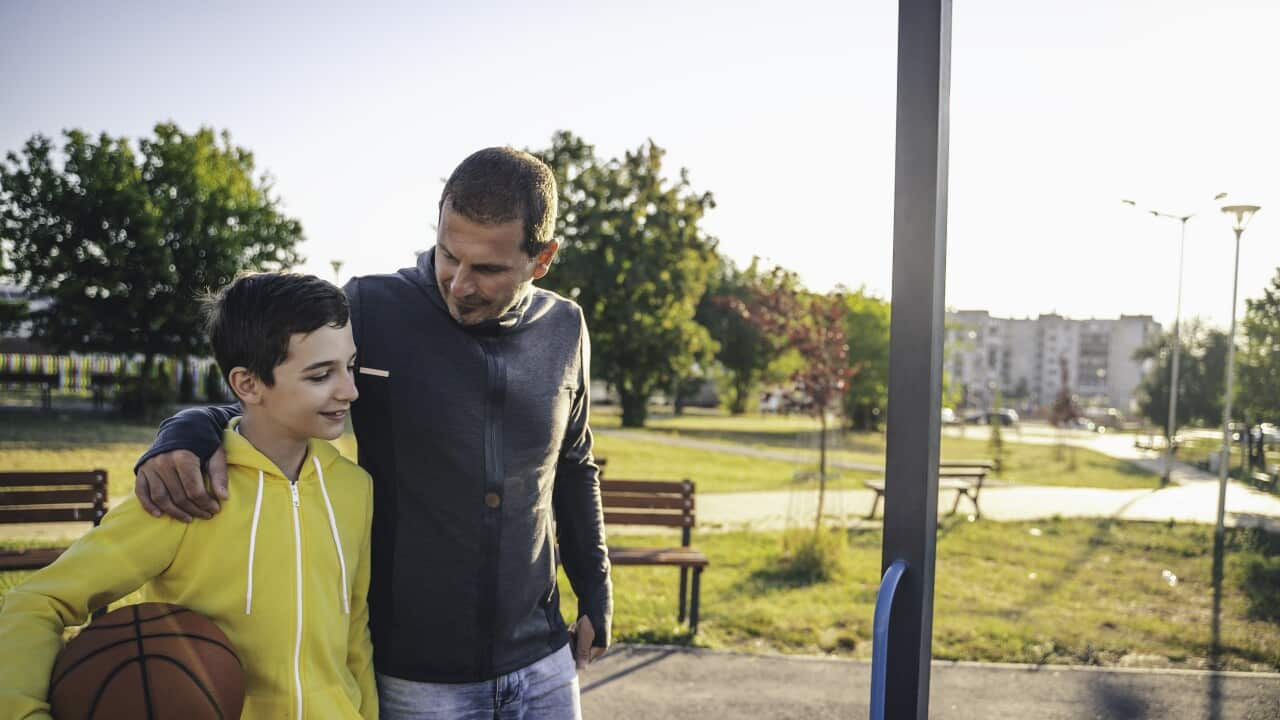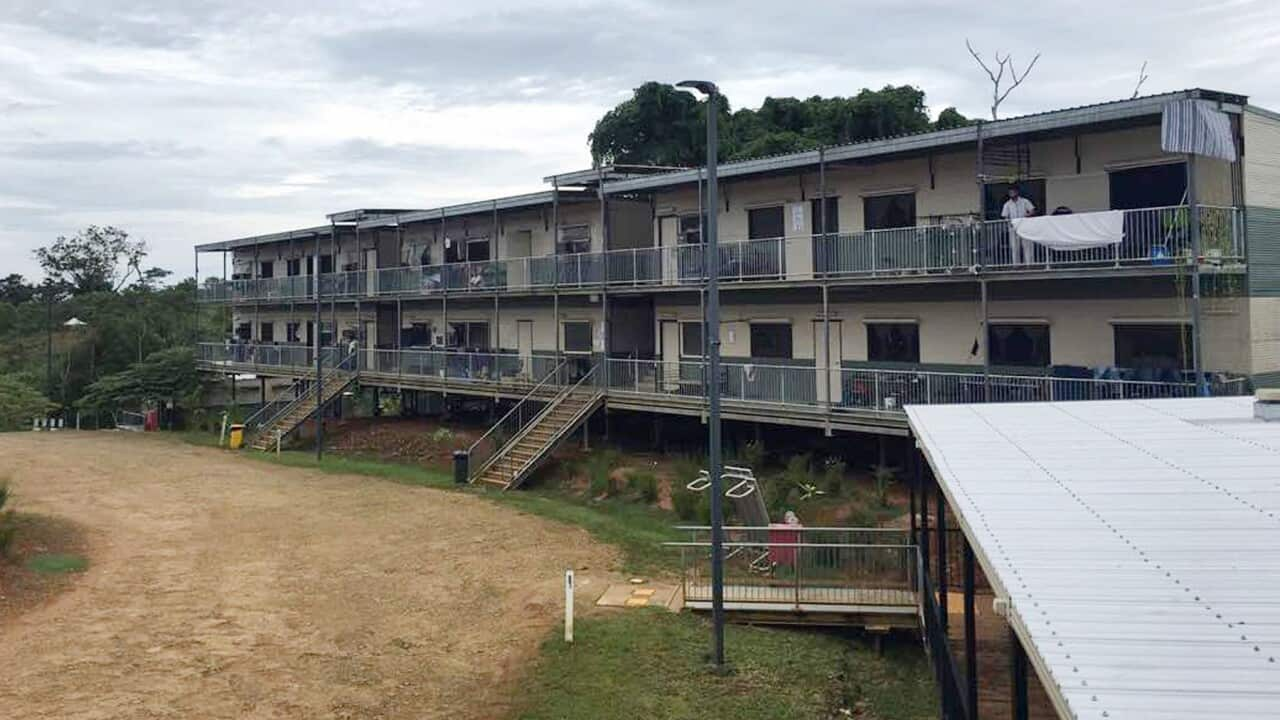Key Points
- 'Stop it at the Start' is an Australian Government funded primary prevention campaign that encourages adults to talk with the young people in their lives about respect.
- Parents and carers should be aware of how they communicate and demonstrate respectful relationships.
- Prevention is crucial to help prevent domestic violence before it starts.
Warning: This content contains details about a domestic violence crime that may be confronting or distressing.
Domestic violence doesn't begin with a single act of physical harm; it often starts with signs of disrespect, control, and emotional abuse that can go unnoticed or unaddressed.
Arman Abrahimzadeh is an Adelaide-based anti-domestic violence campaigner and an advocate for preventing domestic violence. A personal tragedy inspires his mission.
He says his journey began at a young age when he started witnessing frequent violence and abuse in his household.
We found ourselves in a position where we made a decision to pack our bags and leave the family home because we didn't want to take that risk. And once we fled the family home, I thought that was the end of the difficult times.Arman Abrahimzadeh
But it wasn't. Mr Abrahimzadeh believed that leaving home where threats were commonplace and physical abuse occurred regularly would signify the beginning of a new chapter and the end of living in perpetual fear for their safety.
Mr Abrahimzadeh, his mother, and his sisters faced homelessness, poverty, and isolation when they fled the family home.
"We managed to get through that. We got to the point where, 12 months after fleeing the abusive home, my mum and my older sister decided to attend a Persian New Year function.
It was at the Adelaide Convention Centre. This was in March 2010. And without us knowing, my dad also showed up at the function. That was the place where he decided to essentially stab her to death in front of about 300 witnesses," he recalls.

Arman Abrahimzadeh with his late mother Zahra Abrahimzadeh. Credit: Arman Abrahimzadeh
The warning signs
Mr Abrahimzadeh says that in today's Australia, domestic violence are alarming, and in the majority of cases, the perpetrators are current or former partners.
Therefore, it's about time that we highlight the underlying causes that lead to domestic violence and try to prevent it before it happens by looking for the early warning signs.
"Those early warning signs could be anything from gender stereotypes to intimidating, controlling behaviour to some of those disrespectful attitudes that exist in our communities. And sometimes it can be propelled by online content or certain jokes or certain behaviours and attitudes that we see in our community," Mr Abrahimzadeh says.
Modelling respect
Drawing from his experience and reflecting on his memories, Mr Abrahimzadeh says that driving change can start from our homes. It's about modelling respect at home.
"As a young boy, I looked up to my dad and when I saw my dad treat my mum in a particular way... I adopted and learned it. It was a normal thing, and it was an automatic thing for me.
It got to the point where once my father ended up killing my mother, I started to reflect on all those behaviours, which included the way my dad talked to my mum and treated my mum. What the family dynamic looked like in my family home," He adds.
However, after losing his mum, he had to go through a process to unlearn that behaviour and learn a new way of doing things to promote equality in his new family home.
He spent years turning his pain into purpose, advocating for change, and focusing on how we can raise our children to be respectful and empathetic partners.
"I want to make sure that I'm the role model and the sorts of behaviours and attitudes that I show in my family home are being adopted by my young son because, as the research shows, they'll go and replicate that behaviour in their relationships and their own family homes," Mr Abrahimzadeh explains.

Parents and carers should be aware of how they communicate and demonstrate respectful relationships. Source: iStockphoto / Jacob Wackerhausen/Getty Images
She is the director of JK Diversity Consultants and an accredited mental health social worker who specialises in working with migrant and refugee communities in Australia.
Ms Kaur says that parents should question how they communicate, demonstrate respectful relationships, have conversations, and avoid displaying aggressive, undermining, abusive, or emotionally harmful behaviours.
She also explains how some hidden forms of disrespect young people encounter online might influence their behaviours.
Ms Kaur says young people spend much time scrolling through social media platforms. Teenagers have impressionable and developing brains, so what they consume becomes their primary source of knowledge.
"If that information is inaccurate, or is focused on false information, or certain biases, or promoting certain disrespectful beliefs, then for young people, they can start to think that's normal, because that's what they are seeing, and watching, and consuming," Ms Kaur explains.

Young people tend to mimic the behaviour they see in their family homes, adopt it, and consider it normal. Credit: Phynart Studio/Getty Images
Hidden influences
Danny Mikati is a former Sergeant in the NSW Police Force. After years of service, he started working in the domestic violence unit. It was during this time that he witnessed the impact of domestic violence on the community.
Consequently, he dedicated himself to educating and professionally developing himself in countering violence against women and children.
Mr Mikati emphasises the important role of parents and educators in fostering a culture of respect. He believes this is crucial in a world where harmful influences, both online and offline, affect young people.
Parents have no choice but to have at least a basic awareness and understanding of social media. Their children are going to be using it for the rest of their life. Australia is one of those countries that has a very high uptake of social media. Most of our kids by far are on at least one or two different social media platforms. So, parents need to understand the dangers.Danny Mikati
Mr Mikati highlights the vital importance of prevention. It involves showing young people what healthy relationships look like before harmful behaviours take root.
"We can't always just give, make, create more DV [Domestic Violence] refuges, even though obviously there's a need. But if we're always only addressing the reaction or the consequences, we never actually target the core fundamental leading or causative strategies," he says.

Parents, teachers, guardians, and carers should become better equipped to recognise and address signs of disrespect and guide their children towards understanding healthy relationships. Source: iStockphoto / dusanpetkovic/Getty Images/iStockphoto
Stop it at the Start
The Australian Government has introduced several initiatives to combat domestic violence, including the Stop it at the Start campaign.
" is a primary prevention campaign to counter all sorts of toxic masculinity messages that are flowing around especially in recent times throughout social media," he explains.
Ms Kaur is a proud supporter of the Stop it at the Start campaign as a multicultural influencer.
She says it is essential to understand the cultural norms and expectations of migrants and refugees during their settlement journey in Australia.
"If they come from very traditional values and beliefs, those traditions, may not reflect the societal norms that exist within the Australian community. If I look back at some of my experiences with different generations that have come to Australia, the notion of respect and how patriarchy works in some cultures, women may not have an equal say in the household and may not be treated equally," Ms Kaur explains.
She advises parents, teachers, guardians, and carers to become better equipped to recognise and address signs of disrespect and guide their children towards understanding healthy relationships.
It can begin by creating a safe and respectful environment for open conversations and asking questions.
Ms Kaur notes that an effective way for communities to help prevent domestic violence and address it before it begins is by recognising abusive and gender-based violent behaviours and refusing to remain passive bystanders.
"We need to recognise inappropriate behaviour and that it is not accepted in Australia. Then as a bystander, we call it out or we assist. We refer them to an appropriate service. I think the time has already passed that we need both men and women and community leaders to all be on the same page when it comes to addressing issues around gender-based violence," Ms Kaur says.
If you or someone you know is impacted by sexual assault or domestic or family violence, call 1800RESPECT on 1800 737 732 or Lifeline – 13 11 14.
In partnership with Stop it at the Start, an Australian Government initiative.







